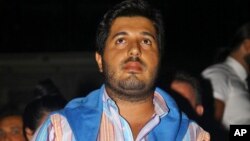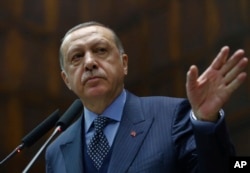Reza Zarrab, a Turkish-Iranian businessman charged with helping Iran circumvent U.S. sanctions, has pleaded guilty, according to U.S. prosecutors, agreeing to provide testimony that could potentially implicate senior Turkish officials in the sanctions-busting scheme and further inflame U.S.-Turkish relations.
Zarrab's agreement to cooperate, reached on Oct. 26 but announced by federal prosecutors in New York on Tuesday, raised questions over whether the 33-year-old gold trader of Iranian ancestry will point fingers at Turkish President Recep Tayyip Erdogan.
Erdogan is not accused of any wrongdoing, but U.S. prosecutors say they have evidence showing Zarrab knew the Turkish president and sought his support for his scheme.
"The assumption all along is that Erdogan certainly knew everything about what was going on," said Nicholas Danforth, a senior policy analyst with the Bipartisan Policy Center in Washington. "Whether or not Zarrab knew that Erdogan knew, whether or not he says that in public, that remains to be seen but it's certainly possible."
As part of his plea agreement, Zarrab will take the stand against a co-defendant in the case, Mehmet Atilla, on Wednesday, prosecutors said. It was not immediately clear what prosecutors have offered Zarrab in exchange for his cooperation.
Atilla is a former deputy general manager of Halkbank, the Turkish state-owned bank accused of facilitating the scheme from 2010 to 2015 while hiding it from U.S. regulators to avoid sanctions. Atilla's trial is expected to last three to four weeks, the judge trying the case said Monday.
Seven others, including Halkbank's former general manager, Suleyman Aslan, and a former Turkish economy minister, Mehmet Zafer Caglayan, remain at large.
Zarrab was arrested in Florida in March 2016 while on a family trip to Disney World, and later moved to New York to face a six-count indictment. The charges included conspiracy to defraud the United States, conspiracy to commit bank fraud, and conspiracy to commit international money laundering. A seventh count was added later, and alleged Zarrab bribed a corrections officer to smuggle cellphones and alcohol into his jail cell in New York.
A conviction on the charges could bring decades in prison.
The disclosure followed weeks of speculation that Zarrab had cut a deal with prosecutors to avoid conviction for his role in running a scheme that allowed Iran to export oil to Turkey in exchange for gold and involved tens of millions of dollars in bribes to Turkish officials.
Pressure on U.S.
It was an outcome Turkish officials had vociferously tried to avoid ever since Zarrab was arrested.
Calling it a politically motivated plot against Turkey, Turkish President Erdogan unsuccessfully pressed the Obama and then Trump White House to drop the case.
And in recent weeks, as speculation grew that Zarrab had become a government witness, the Turkish government stepped up a campaign to discredit potential revelations of high-level corruption and Turkish complicity in the sanctions-busting scheme that might emerge during his trial.
Danforth of the Bipartisan Policy Center said Zarrab's agreement to testify could exacerbate relations with Turkey.
"It raises the stakes for the trial going forward," Danforth said. "We're going to find out what exactly Reza Zarrab knows, what exactly he testifies to in public, and either in the course of his testimony or in the coming weeks, who else prosecutors in the United States might look into."
2013 investigation
The case against Zarrab is rooted in a 2013 Turkish investigation into corruption that led to the arrest of Zarrab and 88 other suspects, including three ministers.
The probe identified Zarrab as the mastermind of an operation to smuggle gold to Iran. To facilitate the scheme, Zarrab was accused to giving tens of millions of dollars to three Turkish officials and the former general manager of Halkbank.
Zarrab was later released and the Erdogan government shuttered the investigation, calling it a foreign-orchestrated conspiracy.
The charges against Zarrab were similar to allegations made by Turkish prosecutors. In the indictment, Zarrab was accused of using his network of shell companies to help Iran evade sanctions.
Under the sanctions, Iran could only deposit proceeds from its sales of oil and gas to Turkey into accounts in Turkey and could only use them to trade goods and serves with Turkey.
To circumvent the sanctions, Zarrab set up a host of shell companies in Iran, Turkey, and China that engaged in fictitious trades. The transactions allowed Iran to receive gold in exchange for its oil exports to Turkey.
Zarrab's lead lawyer, Benjamin Brafman, declined to answer VOA's questions about his client's guilty plea.
Nick Biase, a spokesman for the U.S. District's Office for the Southern District of New York, said the plea agreement remains sealed.





